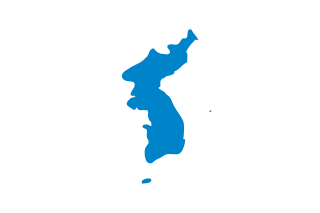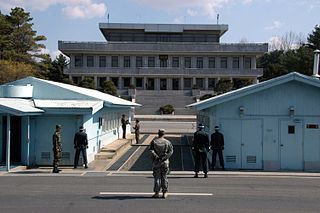
The Korean War was an armed conflict on the Korean Peninsula fought between North Korea and South Korea and their allies. North Korea was supported by the People's Republic of China and the Soviet Union, while South Korea was supported by the United Nations Command (UNC) led by the United States. Fighting ended in 1953 with an armistice, with no treaty signed.

North Korea, officially the Democratic People's Republic of Korea (DPRK), is a country in East Asia. It constitutes the northern half of the Korean Peninsula and borders China and Russia to the north at the Yalu (Amnok) and Tumen rivers, and South Korea to the south at the Korean Demilitarized Zone. The country's western border is formed by the Yellow Sea, while its eastern border is defined by the Sea of Japan. North Korea, like its southern counterpart, claims to be the sole legitimate government of the entire peninsula and adjacent islands. Pyongyang is the capital and largest city.

North Korea has diplomatic relations with 160 states. The country's foreign relations have been dominated by its conflict with South Korea and its historical ties to the Soviet Union. Both the government of North Korea and the government of South Korea claim to be the sole legitimate government of the whole of Korea. The de facto end of the Korean War left North Korea in a military confrontation with South Korea along the Korean Demilitarized Zone.

South Korea, officially the Republic of Korea (ROK), is a country in East Asia. It constitutes the southern part of the Korean Peninsula and borders North Korea along the Korean Demilitarized Zone; though it also claims the land border with China and Russia. The country's western border is formed by the Yellow Sea, while its eastern border is defined by the Sea of Japan. South Korea claims to be the sole legitimate government of the entire peninsula and adjacent islands. It has a population of 51.96 million, of which half live in the Seoul Capital Area, the ninth most populous metropolitan area in the world. Other major cities include Busan, Daegu, and Incheon.

The economy of South Korea is a highly developed mixed economy. By nominal GDP, the economy was worth ₩2.24 quadrillion. It has the 4th largest economy in Asia and the 14th largest in the world as of 2024. South Korea is notable for its rapid economic development from an underdeveloped nation to a developed, high-income country in a few generations. This economic growth has been described as the Miracle on the Han River, which has allowed it to join the OECD and the G20. It is included in the group of Next Eleven countries as having the potential to play a dominant role in the global economy by the middle of the 21st century. Among OECD members, South Korea has a highly efficient and strong social security system; social expenditure stood at roughly 15.5% of GDP. South Korea spends around 4.93% of GDP on advance research and development across various sectors of the economy.

Korean reunification is the hypothetical unification of North Korea and South Korea into a singular Korean sovereign state. The process towards reunification of the peninsula while still maintaining two opposing regimes was started by the June 15th North–South Joint Declaration in June 2000, was reaffirmed by the October 4th Declaration in October 2007 and the Panmunjom Declaration in April 2018, and the joint statement of United States President Donald Trump and North Korean leader Kim Jong Un at the Singapore Summit in June 2018. In the Panmunjom Declaration, the two countries agreed to work to officially end the Korean conflict in the future.

The division of Koreade facto began on 2 September 1945, when Japan signed the surrender document, thus ending the Pacific Theater of World War II. It was officially divived with the establishment of the two Koreas in 1948. During World War II, the Allied leaders had already been considering the question of Korea's future following Japan's eventual surrender in the war. The leaders reached an understanding that Korea would be liberated from Japan but would be placed under an international trusteeship until the Koreans would be deemed ready for self-rule. In the last days of the war, the United States proposed dividing the Korean peninsula into two occupation zones with the 38th parallel as the dividing line. The Soviets accepted their proposal and agreed to divide Korea.

The Korean Demilitarized Zone is a heavily militarized strip of land running across the Korean Peninsula near the 38th parallel north. The demilitarized zone (DMZ) is a border barrier that divides the peninsula roughly in half. It was established to serve as a buffer zone between the sovereign states of the Democratic People's Republic of Korea and the Republic of Korea under the provisions of the Korean Armistice Agreement in 1953, an agreement between North Korea, China, and the United Nations Command.

The 2018 Winter Olympics, officially the XXIII Olympic Winter Games and also known as PyeongChang 2018, were an international winter multi-sport event held between 9 and 25 February 2018 in Pyeongchang, South Korea, with the opening rounds for certain events held on 8 February, a day before the opening ceremony.

A peace walk or peace march, sometimes referred to as a peace pilgrimage, is a form of nonviolent action where a person or group marches a set distance to raise awareness for particular issues important to the walkers.
People defect from North Korea for political, material, and personal reasons. Defectors flee to various countries, mainly South Korea. In South Korea, they are referred to by several terms, including "northern refugees" and "new settlers".

Formerly a single nation that was annexed by Japan in 1910, the Korean Peninsula was divided into occupation zones since the end of World War II on 2 September 1945. The two sovereign countries were founded in the North and South of the peninsula in 1948, leading to the formal division. Despite the separation, both have claimed sovereignty over all of Korea in their constitutions and both have used the name "Korea" in English. The two countries engaged in the Korean War from 1950 to 1953 which ended in an armistice agreement but without a peace treaty. North Korea is a one-party state run by the Kim family. South Korea was formerly governed by a succession of military dictatorships, save for a brief one-year democratic period from 1960 to 1961, until thorough democratization in 1987, after which direct elections were held. Both nations claim the entire Korean Peninsula and outlying islands. Both nations joined the United Nations in 1991 and are recognized by most member states. Since the 1970s, both nations have held informal diplomatic dialogues in order to ease military tensions.

Kim Il Sung was a North Korean politician, revolutionary, and military leader. He founded the Democratic People's Republic of Korea, commonly known as North Korea, which he led as Supreme Leader from its establishment in 1948 until his death in 1994. Afterwards, he was succeeded by his son Kim Jong Il and was declared Eternal President.

Chadwick International is a PK-12, coeducational, nonsectarian, non-profit, independent, international day school located in Songdo, South Korea. The curriculum is based on the International Baccalaureate (IB) program and received PYP, MYP, DP, and CP accreditations. It is currently run by the Roessler-Chadwick Foundation and is named after Chadwick School in Palos Verdes, California, United States. The school has three divisions, which are the Village School (PK-G5), the Middle School (G6-8), and the Upper School (G9-12).

Andrew Yeom Soo-jung is a Korean prelate of the Catholic Church who was the Archbishop of Seoul from 2012 to 2021, while also holding the title of Apostolic Administrator of the Diocese of Pyongyang in North Korea. Pope Francis made him a cardinal in 2014. He was also the chairman of Catholic Peace Broadcasting Corporation (CPBC).

Relations between the Republic of Singapore and the Republic of Korea started when a trade mission from South Korea visited the Colony of Singapore in 1950. The two countries established formal diplomatic relations in 1975, but South Korea established a trade office and a consulate-general, and sent a special envoy to visit Singapore before that. Both countries are the only two United Nations members in the Four Asian Tigers. In 2014, South Korea was the fourth-largest import source of Singapore.

Kyrgyzstan competed at the 2018 Winter Olympics in Pyeongchang, South Korea, from 9 to 25 February 2018. The team, announced on January 10, 2018, consisted of two male athletes, one competing in alpine skiing and the other in cross-country skiing.

North Korea–Spain relations are the bilateral and diplomatic relations between these two countries. North Korea operated an embassy in Spain from 2014 to 2023, although the embassy does not engage in consular affairs as there are no North Korean civilians currently residing in Spain. Spain does not have an embassy in North Korea, but its embassy in South Korea operates for matters related to Spanish citizens who intend to travel to North Korea. In addition, the Spanish Ministry of Foreign Affairs recommends its registration at the Seoul embassy, given the possibility that relations between the two Koreas, already delicate, may worsen at any time. That is why Spain considers the entire territory of North Korea as a risk zone for Spanish citizens traveling to this country.
Transgender is a term describing someone with a gender identity inconsistent with that which was assigned to them at birth. In South Korea, transgender communities exist and obtaining gender affirmation surgery is possible, but there are many barriers for transgender people in the country. The former head of the LGBT Human Rights of Korea once stated that "Of all sexual minorities, transgender is the lowest class. They are often abandoned by their families and most of them drop out of school because of bullying. The inconsistency between their appearance and their citizen identification numbers often makes it hard for them to land decent jobs."
















